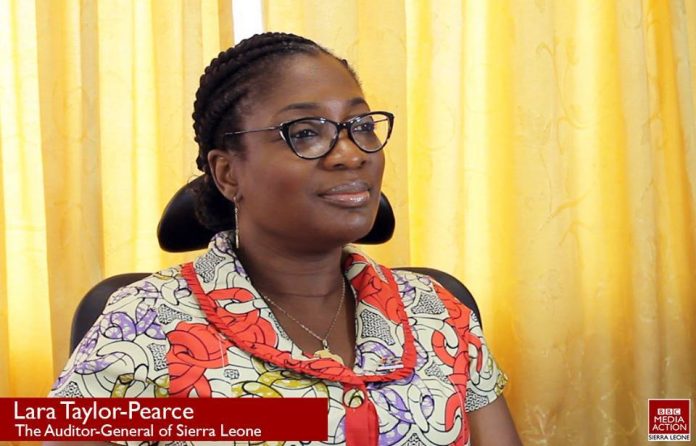By Amin Kef Sesay
The Auditor General, Lara Taylor-Pearce, in a statement on the 2019 Audit Reports, highlighted how over the years they have conducted audits on a wide range of services and programmes delivered by Ministries, Departments and Agencies and other institutions in the broader public sector.
“We have identified areas that need improvement and have taken great care to make practical recommendations based on our audit findings,” she disclosed adding that recommendations are a critical part of their audit reports further underscoring that their implementation is important to drive positive improvements in the
cost-effective delivery of programmes and services for Sierra Leoneans.
She pointed out that the audit process seeks input and agreement on these recommendations from senior management in the MDAs they audit, prior to the finalization of the reports.
“Management believes that identifying issues and providing recommendations is only the first step,” the Auditor General stated.
Based on what she said, the real work begins when those responsible, take action to put the recommendations into practice.
She said it is for that reason that a key part of their work is to follow up on recommendations made in past audits, in order to assess the progress made on their previously recommended actions.
She acknowledged that the outbreak of COVID-19 has had a negative impact on all activities across the country.
“The emergence of the virus in Sierra Leone like in other African countries has created a situation engulfed with a mix of several consequences such as; the lockdowns, social-distancing, closure of borders, disruptive changes to private businesses, fear and stigmatization which have affected households and economic activities,” she stated.
The COVID-19 pandemic, she said, has not only negatively impacted businesses, but has also considerably impeded the work of the ASSL.
She disclosed that in this 2020 financial year, a considerable number of their planned audits were not completed maintaining that as an organization they have instituted measures aimed at protecting their staff, whilst at the same time ensuring optimum productivity.
“Most of our audit clients however maintained half workforce capacity, following Government’s directive to cut down on the number of staff coming to the offices nationwide during this period,” she said continuing that such resulted in delays and unavailability of audit clients to provide requisite information for the audits.
She said the pandemic also prevented their staff from benefiting from much-needed face-to-face continuous professional development trainings.
“Amidst this dismal situation, the ASSL staff were able to consolidate the knowledge acquired in the 2019 integration audits and from the introduction of new audits methodologies as dictated in the
Financial Audit Manual (FAM) and Compliance Audit Manual (CAM),” she revealed stating how those frameworks were used
in evidence gathering, data analysis, identification of a deeper audit scope, and most importantly, they also enhanced to a greater extent, the capacity of their staff in carrying out specialized audits.
“We have established an Information Technology Audit Unit which will seek to evaluate the information systems within MDAs and the safeguards available to protect these systems,” the Auditor General informed.
She disclosed how they continued with their inclusive approach during the development of the ASSL Strategic Plan 2021-2025.
The Auditor General stated that Questionnaires developed along various thematic areas were used to guide the discussions with Civil Society Organizations, MDAs and other stakeholders.
She said it is her firm belief that the contributions of these stakeholders will help shape a more inclusive strategic plan, which will serve as a requisite for public sector oversight bodies.
The Auditor General stated that Management would like to recognize the Government of Sierra Leone for its sustained commitment to reforms within the public sector.
She acknowledged the role played by the PAC for its continued public scrutiny of their reports and those of other oversight bodies. “Their support is critical to ensuring the achievement and sustainability of audit outcomes,” she maintained.
According to her, the ASSL remains firmly committed to making positive contributions in overcoming the obstacles to prudent financial management and control.
She said they will continue to make themselves available and provide
proactive insights into the root causes of weak internal control environments.
“The engagements will include timely feedback on and inputs into the adequacy of the assurance provided by all stakeholders,” she assured adding that they would also want to acknowledge development partners who have continued to show interest in the solidification of the operational competence within the ASSL.
She extended on behalf of Management its sincere thanks and appreciation to all ASSL staff for the continued devotion to their duties and responsibilities against all odds.




